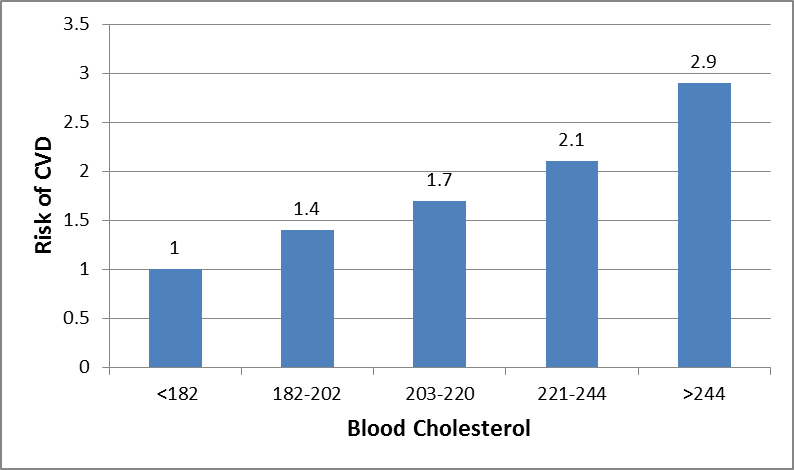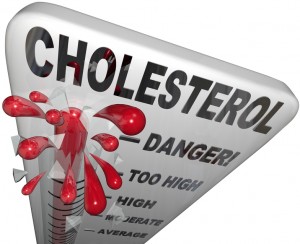A few weeks ago I began discussing a topic that is very pertinent to the fire service – heart health.
Aside from smoking, there are 5 major heart disease risk factors: obesity, low aerobic fitness, high blood pressure, high blood glucose (development of type II diabetes), and poor blood cholesterol.
Today’s topic is cholesterol. Although you can’t feel it, it’s really bad to have poor cholesterol. That’s because risk of CVD rises sharply as your cholesterol increases. As a firefighter, having high cholesterol makes you more than FOUR TIMES as likely to suffer a CVD related death (heart attack or stroke) on duty.

Now before you check out because you think you’re too young for this – this COULD be you. In the many firefighter fitness tests that I’ve conducted over the years I’ve seen even very young, seemingly healthy people with poor blood cholesterol!
How cholesterol works
About 50% of our cholesterol is made in our bodies because it serves many vital functions. But while cholesterol is essential for us, if we have too much of it, it sticks to the artery walls and forms plaque which leads to heart/cardiovascular disease (CVD).
So how do we get too much? We take in cholesterol by eating animal products: meat, eggs and high fat dairy products like milk, cheese, yogurt, ice cream, butter, etc. When we eat cholesterol our bodies are supposed to compensate by making less. However, that doesn’t happen for all people (this is genetic). Therefore, some people have to work harder than others to keep their cholesterol down.
Our “bad” cholesterol, LDL, delivers cholesterol to bodily cells which, in excess, is what results in plaque formation. Our “good” cholesterol, HDL, goes through the blood and picks up excess cholesterol and delivers it to the liver so it can be excreted. Therefore, it is just as important to have high HDL as it is to hav e low LDL and total cholesterol.
e low LDL and total cholesterol.
Lowering your cholesterol is one of the best things you can do to reduce your risk of CVD. Research shows that for every 1% reduction in blood cholesterol, you cut your risk of developing CVD by 2-3%.
How to improve your cholesterol
Here’s what you can do to improve your cholesterol, in order of importance. Notice that there are completely different methods for treating high LDL/total cholesterol versus low HDL:
Reducing your LDL and total cholesterol:
- lose weight
- Eat less saturated and trans fats. Reduce cholesterol intake by choosing lower fat meat and dairy products.
- Eat more fruits, vegetables, beans and oats- fiber and antioxidants are especially effective for reducing LDL
Improving your HDL cholesterol and total cholesterol/HDL ratio:
- Exercise at least 90 min/week (even in the absence of weight loss, exercise will raise HDL!)
- avoid smoking and limit alcohol consumption to a moderate amount
- eat more omega-3 fatty acids: fatty fish (salmon, tuna) and shellfish, dark green leafy vegetables, flaxseed, soybeans, walnuts, canola oil
I challenge you to take the pledge to either have your cholesterol levels checked and/or take action to improve your cholesterol. Please leave your name below so we can cheer you on.
If you’re not on my list to get more health tips like these, enter your name and email below.





Karlie,
Great article about the importance of maintaining a healthy level of cholesterol. One thing I might suggest to folks out there is in addition to having your cholesterol levels checked and profiled is to have your provider screen for a marker called Lipoprotein A. If you have Lipoprotein A in your blood, it means that your cholesterol is extra “sticky,” so it should be managed more aggressively than those without it. But, don’t worry too much, if you can get your total cholesterol down below 100, the effect of the Lipoprotein A is negligible.
thanks for sharing that Chris!
Doesn’t eating too much sugar cause inflammation in the body, arteries, ect. Which increases the risk that cholesterol will build up in our arteries?
Aren’t we suppose to limit added sugar? For women 24 g or 6 tsp and men 36 g or 9 tsp a day. Lots of added sugar in so many products. But so many people are unaware of what they’re eating.
Thanks Karlie,
Scott
Thanks Scott. Yes, sugar in high amounts is pretty toxic in the body. It definitely plays a role in inflammation, which we know is a contributor to the development of heart disease and it’s risk factors – like cholesterol.